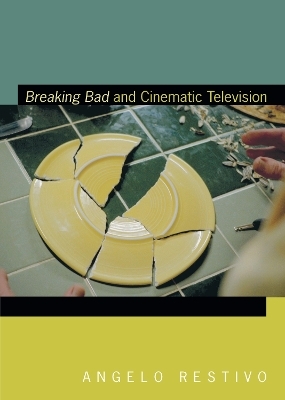
Breaking Bad and Cinematic Television
Seiten
2019
Duke University Press (Verlag)
978-1-4780-0308-3 (ISBN)
Duke University Press (Verlag)
978-1-4780-0308-3 (ISBN)
Angelo Restivo uses the innovative show Breaking Bad as a point of departure for theorizing a new aesthetics of television in which the concept of the cinematic points to the ways in which television can change the ways viewers relate to and interact with the world.
With its twisty serialized plots, compelling antiheroes, and stylish production, Breaking Bad has become a signature series for a new golden age of television, in which some premium cable shows have acquired the cultural prestige usually reserved for the cinema. In Breaking Bad and Cinematic Television Angelo Restivo uses the series as a point of departure for theorizing a new aesthetics of television: one based on an understanding of the cinematic that is tethered to affect rather than to medium or prestige. Restivo outlines how Breaking Bad and other contemporary “cinematic” television series take advantage of the new possibilities of postnetwork TV to create an aesthetic that inspires new ways to think about how television engages with the everyday. By exploring how the show presents domestic spaces and modes of experience under neoliberal capitalism in ways that allegorize the perceived twenty-first-century failures of masculinity, family, and the American Dream, Restivo shows how the televisual cinematic has the potential to change the ways viewers relate to and interact with the world.
With its twisty serialized plots, compelling antiheroes, and stylish production, Breaking Bad has become a signature series for a new golden age of television, in which some premium cable shows have acquired the cultural prestige usually reserved for the cinema. In Breaking Bad and Cinematic Television Angelo Restivo uses the series as a point of departure for theorizing a new aesthetics of television: one based on an understanding of the cinematic that is tethered to affect rather than to medium or prestige. Restivo outlines how Breaking Bad and other contemporary “cinematic” television series take advantage of the new possibilities of postnetwork TV to create an aesthetic that inspires new ways to think about how television engages with the everyday. By exploring how the show presents domestic spaces and modes of experience under neoliberal capitalism in ways that allegorize the perceived twenty-first-century failures of masculinity, family, and the American Dream, Restivo shows how the televisual cinematic has the potential to change the ways viewers relate to and interact with the world.
Angelo Restivo is Associate Professor in the School of Film, Media, and Theatre at Georgia State University and author of The Cinema of Economic Miracles: Visuality and Modernization in the Italian Art Film, also published by Duke University Press.
Note to the Reader ix
Acknowledgments xi
Introduction 1
1. The Cinematic 25
2. The House 54
3. The Puzzle 81
4. Just Gaming 116
5. Immanence: A Life 137
Notes 159
Bibliography 171
Index 179
| Erscheinungsdatum | 29.03.2019 |
|---|---|
| Reihe/Serie | Spin Offs |
| Zusatzinfo | 69 illustrations |
| Verlagsort | North Carolina |
| Sprache | englisch |
| Maße | 149 x 210 mm |
| Gewicht | 318 g |
| Themenwelt | Kunst / Musik / Theater ► Film / TV |
| Kunst / Musik / Theater ► Theater / Ballett | |
| Sozialwissenschaften ► Kommunikation / Medien ► Medienwissenschaft | |
| ISBN-10 | 1-4780-0308-1 / 1478003081 |
| ISBN-13 | 978-1-4780-0308-3 / 9781478003083 |
| Zustand | Neuware |
| Haben Sie eine Frage zum Produkt? |
Mehr entdecken
aus dem Bereich
aus dem Bereich
wie KI und virtuelle Welten von uns Besitz ergreifen – und die …
Buch | Hardcover (2023)
Heyne (Verlag)
22,00 €
eine jüdische Filmgeschichte der Bundesrepublik
Buch | Hardcover (2023)
Hanser (Verlag)
28,00 €


